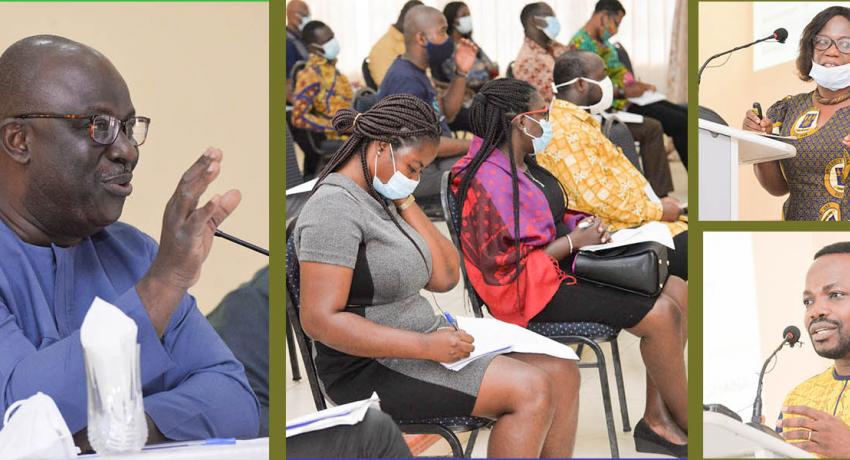Around the world, the COVID-19 crisis is being used by states as an opportunity to reassess sectoral vulnerabilities with the view to transform economies for the better. Conscious of the central role of research knowledge and insights in fostering development success, and the need to project an objective voice that counters the likely influence of politically-motivated promises that characterise electoral periods ( as Ghana gears up for elections in December), ISSER organised a panel discussion on a theme of high importance to Ghana’s development -- agriculture.
Held on 12 November at the ISSER Conference Center and under strict adherence to COVID-19 prevention protocols, the event provided a non-partisan and inclusive platform to discuss the topic: Boosting Agricultural Value Chains in the midst of COVID-19 and Political Party Manifestos.
It was chaired by Prof Peter Quartey, with Mr Kwesi Korboe (CEO, GIRSAL) as the keynote Speaker, and Prof Irene Egyir (Department of Agricultural Economics and Agribusiness, University of Ghana), Dr. John Saviour Eleblu (West Africa Centre for Crop Improvement, WACCI) and Dr Fred Dzanku (ISSER) as discussants.
Participants -- which included academics, sector practitioners and the media -- agreed that while agriculture was impacted (negatively but also positively) by the COVID-19 crisis, it uniquely showed resilience and some amount of growth, unlike other sectors. However, historically inherent challenges persist and these must be addressed in order to boost resilience and prosperity, and ensure improved outcomes for those engaged in the value chain.
Here are three key takeaways from the panel discussion:
Building efficiency within the agricultural value chain is central to success
Building efficiency across the length and breadth of the value chain is critical. This would involve concerted government investment in and the use of research and development (R&D) and biotechnology-driven innovation and tools, and the adoption of strategies aimed at reducing post-harvest losses including mechanisms to extend the shelve life of perishable products and the structuring of markets to reduce risks.
Incentives are important in attracting and keeping private investors and school leavers in the agricultural value chain
There is the need to move interventions beyond handouts to well-thought out and sustainable financial and non-financial incentive programmes. Besides ensuring easy and affordable access to funding (for smallholder farmers especially), non-financial incentives -- including policies to minimise imports and the imbalanced competition burden it places on local products, access to mechanization systems, infrastructure and logistics (roads, research and extension services, markets etc.) are essential to boost the fortunes of the value chain.
Focus is critical to foster meaningful impact
In order foster meaningful and sustained impact, there is the need to focus limited resources on the most promising interventions. Commenting on the influence of political party manifesto promises on how agricultural development interventions are conceived and implemented, Prof Quartey said: “The political party manifestos are rich with ideas but some of the promises are quite difficult to achieve within four years.” He asked the critical question: “Where is the money?” Dr Dzanku, on his part, decried what appeared to be a competition for promises by the major political parties. In order to inject focus and minimize the influence of politics on agricultural and other sectoral development plans, Prof Quartey reiterated a note-worthy proposal he made recently at the 13th National Development Forum organised by the National Development Planning Commission (NDPC): that political party manifestos be based on and aligned with long-term national development plans. Also, the resulting plans must be backed by sustainable financing strategies to move them beyond mere ideas.
Participants agreed that some good initiatives and successes are in place, but there is a lot of room for improvement. The above takeaways (recommendations), if implemented, will contribute to boosting the agricultural value chain.
A live recording of the event is accessible here. Selected media reports on the event are below:

